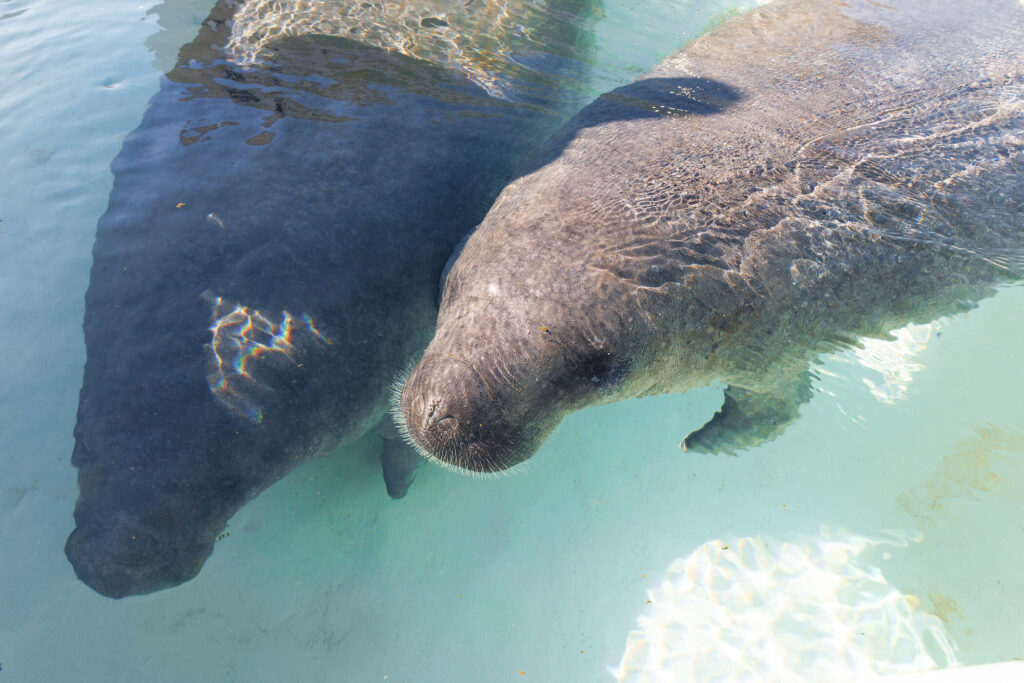The following story ran in the fall 2022 Mote Magazine, a special publication distributed to Mote’s members and donors twice a year.
In the shallow salt water of the Gulf of Mexico swims a female manatee and her calf, tooling around and grazing on seagrass. The manatee calls to her calf, but what is she trying to say?
Dr. Beth Brady, a Mote Postdoctoral Research Fellow, strives to answer that question. She and Mote Marine Laboratory’s Manatee Research Program study the behavioral ecology, distribution, habitat, genetics, and population status of Florida manatees while providing insights to advance manatee conservation and research. Brady believes that understanding how manatees communicate reveals what is important to them and how humans may affect them.
One significant form of communication for manatees and other mammals is acoustic—using sound. Florida manatees produce five broadly-defined call types and have a strong sense of hearing, so researchers are curious to know how much they rely on sounds.
After 13 years of studying manatees, Brady continues to focus her research on their acoustic communication and how human activity may influence it, while also studying their vocal anatomy.
Brady conducts “playback experiments,” playing recordings of specific sounds that are tonal or atonal (with or without a definite pitch) for manatees underwater to monitor their response, in an effort to determine what is important to them. She works with Hugh and Buffett, Mote Aquarium’s resident Florida manatees, and compares results to those from her studies with Antillean manatees in Mexico.
“Every time we played a sound, the Antillean manatees were curious. They would stop, turn around, and go towards the speaker,” Brady said. “They were more inquisitive.”
Here in Florida, Brady noticed a difference in results.
“Hugh and Buffett don’t make any kind of behavioral changes that we can visibly see,” she said. “They continue what they’ve been doing, but what we’re finding is they’re increasing their own number of vocalizations, which is fascinating.”
Mote scientists don’t know if Antillean manatees generally respond differently to sounds than Florida manatees, or if the differences in this experiment have more to do with the individual animals or their environment. Continued research is needed to better understand what these results mean.
“As resident animals at Mote, Hugh and Buffett provide a baseline that we can use to help us understand communication in their wild counterparts.”
Brady noted wild manatee sounds are often based on their behavior, too. The structure of their call may be more flat or tonal if they are resting and feeding, while their call may be more varied in pitch when their excitement increases.
“These studies give us an idea of how important communication is to manatees,” said Brady. “We have many anthropogenic, or human, impacts such as boat noise that may make it difficult for manatees to hear one another. To support manatee conservation, it would be valuable to know how boat engine noise affects their ability to communicate.” It is critical to understand how manatees rely on sounds and how human-induced noise may impact their communication in order to conserve their populations.
Q & A with Dr. Beth Brady
What is a manatee’s intelligence level?
Their cognitive capabilities have not been heavily investigated, but I think they have excellent memory. They have to remember where their warm water refuges are. We will be looking into vocal learning, similar to research on elephants, their most closely related species on land, which have the ability to mimic and imitate human sounds. So, what about a manatee? Can you train a manatee to voluntarily vocalize when asked and then train it to imitate something? Do they have the cognitive capabilities to do that? We don’t know yet.
What are a manatee’a strongest and weakest senses?
A manatee’s strongest senses are their hearing and their tactile senses. Their weakest sense is their vision.
Can manatees be right or left flippered?
It looks like sometimes Hugh will use one flipper more when he turns to make circles, so possibly.


